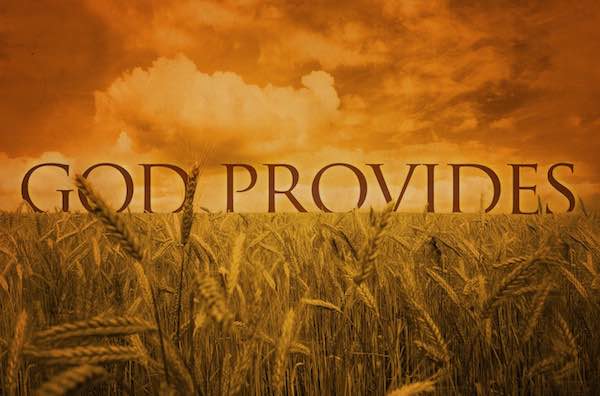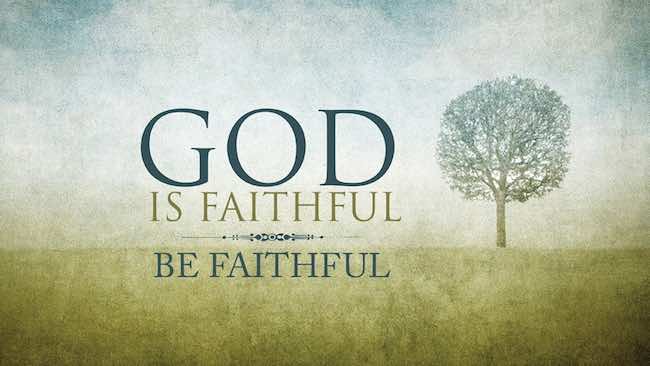Does God promise wealth for those who walk in His ways?
A person’s faith and theology certainly effect how one lives his or her life. There is a popular teaching today called “Prosperity Theology,” which promotes a “name it and claim it” ideology and teaches that one’s wealth is only limited by an individual’s lack of faith.
As we study this week’s Torah Portion, which is called “בחוקותי” – “be’chukotai” and means “in my statues,” we will examine this teaching of “Prosperity Theology” and learn what it means to walk in God’s holy ways and to receive His blessings.
Watch this video for an overview of this week’s commentary!
“Be’Chukotai” – “In My Statues”
This week’s Torah Portion begins with the LORD giving specific conditions for the children of Israel to obey in order to receive the blessing of the LORD:
If you walk in My statutes and keep My commandments so as to carry them out, then I shall give you rains in their season, so that the land will yield its produce and the trees of the field will bear their fruit. – Lev. 26:3-4
The LORD set before the children of Israel the path of life by giving them His holy commands. The LORD wanted to pour out His blessings on His people but this would be contingent on their following after God with a whole heart and keeping His ways.
The Blessing of Rain
The first blessing that the LORD listed in this section of the blessings (Lev. 26:3-13) is the “giving of rains in their season” (Lev. 26:4). This may seem like an insignificant blessing, however, it is actually the foundation for provision and sustenance. The giving of rains in their proper season allows the land to bring forth produce from what is planted and provide fruit from the trees:
…then I shall give you rains in their season, so that the land will yield its produce and the trees of the field will bear their fruit. Indeed, your threshing will last for you until grape gathering, and grape gathering will last until sowing time. You will thus eat your food to the full and live securely in your land. – Lev. 26:4-5
The provision of rains at their proper time is the basis of a healthy and flourishing ecosystem which can provide abundant food and satisfy the needs of a nation. There are places in Israel that have sunny days for 354 days out of the year. This factor combined with sufficient rains creates a farmer’s paradise. They would eat their food in satisfaction and be full! This is the blessing of the LORD.
The Blessing of Peace
If the children of Israel would walk in the ways of the LORD, God also promised peace in the Land. God promised that he would remove harmful beasts and cause their enemies to fear them (Lev. 26:6-8). A land at peace is destined to prosper, especially as the people walk in the ways of the LORD.
The Blessing of Abundance
The blessings that followed adherence to God’s statutes and commandments were not just survival in the Land, God promised abundance:
Indeed, your threshing will last for you until grape gathering, and grape gathering will last until sowing time. You will thus eat your food to the full and live securely in your land. – Lev. 26:5
You will eat the old supply and clear out the old because of the new. – Lev. 26:10
God promised to so bless the produce of the Land that they would be clearing out the old crops to make room for the new. The blessing of abundance not only provided food in plenty for the nation but it also provided financial income through the over abundance of the crops. This is also true today in Israel. The total export of agricultural fresh produce and processed food from Israel in 2012 was $2.4 billion!
The Blessing of God’s Presence
Above and beyond the basic provisions of water, food, peace, and safety, the LORD promised an even greater blessing if the children of Israel obeyed Him:
Moreover, I will make My dwelling among you, and My soul will not reject you. I will also walk among you and be your God, and you shall be My people. – Lev. 26:11-12
It was a picture of perfect harmony: provision in abundance, peace in the Land, and God’s presence in the midst of His people. Who could ask for anything more?
Is God’s Blessing Still Valid for His People Today?
I was talking with a friend, whom we’ll call Avraham, early on in this week about the current Torah Portion and this subject of the blessings found in the Torah in relation to the Israelites keeping God’s Word. Avraham was explaining to me how he found it difficult to apply this principle of the so called “blessings and curses” in the Torah because we are no longer under the Old Covenant.
Avraham also explained how, according to his perspective, the Israelites were promised great wealth if they walked in God’s ways but in the New Testament we are only promised persecution for following after God. According to Avraham, who is a Jewish believer in Yeshua, this principle of blessing as a result of walking in God’s commandments and punishment for transgressing God’s commandments is no longer valid for believers today. Is this really the case? It is true that we are no longer bound by the Old Covenant, however, is there a New Testament teaching regarding the blessing of the LORD for those who keep His Word?
The Prosperity Gospel
On the other side of this argument is “Prosperity Theology.” There are both Christian and Messianic preachers who teach what is often termed “The Prosperity Gospel” or “Health and Wealth Theology” for all of those who believe in Yeshua and walk in faith in all of the promises of God. “Prosperity Theology” would even go so far as to say that if you have faith, you will be wealthy and you will not suffer from illness. To read more about “Prosperity Theology,” I recommend the following article: Prosperity
How are we to balance these two extreme views? What does God’s Word really teach us?
Does God’s Word guarantee great wealth for His people if they walk in His ways? Or according to my friend Avraham, are believers in Yeshua disconnected from God’s blessings today and only guaranteed persecution?
I personally do not adhere to either of these two views, however, I do believe that there is a balance between them that is more accurately taught in God’s Word. I would like to begin by looking deeper into the text of this week’s Torah Portion.
Properly Appropriating God’s Promises
When God promised blessing and abundance to His people if they obeyed His commandments in Leviticus 26, the blessing was not focused on extreme wealth but in full satisfaction: “…You will thus eat your food to the full and live securely in your land.” (Lev. 26:5). God had promised that the Israelites would “eat your food to the full.” This phrase in Hebrew is “ואכלתם לחמכם לשובע” – “vachaltem lachmechem lasovah,” which is literally translated as “you will eat your bread (food) to satisfaction.”
Complete Satisfaction
The Hebrew word for “full” or “satisfaction” is “שובע” – “sovah,” which means “full, satisfied, content, or sated.” This word has the same root as the number seven, in Hebrew “שבע” – “sheva” which also has the meaning of “fullness or completion.”
I believe that this word “satisfaction” – “שובע” – “sovah” reveals the foundational meaning to this whole subject of the blessings and curses in the Torah; if they children of Israel walked in God’s commandments they would in-turn receive the blessings of God and would be fully satisfied with all they needed in this life. The focus was not in extreme wealth but rather in satisfaction, completion, and fullness in all that God provided.

Part of the punishment or the curse for not keeping God’s Word was to live in a situation of constant want or dissatisfaction. We see this illustrated in this text as well:
When I break your staff of bread, ten women will bake your bread in one oven, and they will bring back your bread in rationed amounts, so that you will eat and not be satisfied. – Lev. 26:26
The last phrase in this verse “you will eat and not be satisfied” in Hebrew is “ואכלתם ולא תשבעו” – “vachaltem velo tisba’u.” The same word for being satisfied “שובע” – “sovah,” which was used in Leviticus 26:5, is used here in Leviticus 26:26. There is complete satisfaction for those who walk in God’s ways and a lack of satisfaction for those who choose to not walk in His ways.
The Real Walk of Fatih
I am obviously simplifying the greater extent of the blessings and curses mentioned in Leviticus 26, however, this general principle of finding complete satisfaction in life as a result of walking in God’s ways is certainly well founded. It is also important to understand that all of God’s blessings and curses are a general outcome of a people who choose to adhere or ignore the commands of God. The blessings of God for those who walk in His ways in no way guarantees a life of health and wealth and complete peace from one’s enemies. This is true in both the Old and New Testaments.
If all of the blessings find in Leviticus 26 are taken as an absolute standard as a result of obedience than God needs to apologize to nearly all of the prophets and those who lived righteously in the Old Testament. Almost without exception, the men and women of faith whom we read about in the Old Testament (Jacob, Joseph, the children of Israel in Egypt, Moses, King David, Job, Jeremiah, etc…) suffered greatly from their enemies and at times were barely sustained by the food they ate. God was faithful to each one of them and sustained them in their times of testing, however, we cannot say that they all suffered as a result of sin or disobedience. Prosperity Gospel teaching is not sustained in the Old Testament or the New Testament.
Persecution for Righteousness’ Sake
In the New Testament, Yeshua taught that those who follow after Him would be persecuted (John 15:20). He also taught in the “Sermon on the Mount” that there was a blessing in being persecuted for the sake of righteousness:
Blessed are you when people insult you and persecute you, and falsely say all kinds of evil against you because of Me. Rejoice and be glad, for your reward in heaven is great; for in the same way they persecuted the prophets who were before you. – Matt. 5:10-12
There is a certain guarantee that those who follow after Yeshua and seek to walk in God’s ways will be persecuted, however as Yeshua stated in this verse, this is no different from what the prophets endured under the Old Covenant. Living a righteous life will include persecution somewhere along the way, however, this in no way invalidates God’s promises.
Choosing Your Master
In this same context of the “Sermon on the Mount,” Yeshua warned His followers about pursuing wealth in one’s life:
No one can serve two masters; for either he will hate the one and love the other, or he will be devoted to one and despise the other. You cannot serve God and wealth. – Matt. 6:24
If a person chooses to pursue wealth with his or her time and energy, God will become a hindrance to them and their love for God will grow cold. We all must choose whom we will serve and who will be master of our life. To read more about this subject, I recommend last years commentary on this subject: the gods we serve
The Blessing of God
After giving a strict warning about the dangers and futility of pursuing wealth, Yeshua taught about the blessing of God for those who walk in His ways. Yeshua instructed the people not to be anxious about the worries of this life but to keep God’s ways and let Him provide according to His ability:
Do not worry then, saying, ‘What will we eat?’ or ‘What will we drink?’ or ‘What will we wear for clothing?’ For the Gentiles eagerly seek all these things; for your heavenly Father knows that you need all these things. But seek first His kingdom and His righteousness, and all these things will be added to you. – Matt. 6:31-33
Food, water, and clothing are all basic essentials in life that we all seek to provide for ourselves and our families. Just as God promised to faithfully provide these necessities in abundance to the children of Israel, even so Yeshua promised that all who seek first the kingdom of God and His righteous ways will have these necessities faithfully provided by the Father in heaven.
The True Prosperity Gospel
It is easy to take a verse from here or a verse from there and to formulate a way of living that suits our own desires or wants, however, I believe that as we look at God’s Word from a wholistic perspective we will consistently see that God desires for His people to live a productive life, working six days and resting one, and at the same time to always live within His prescribed ways and His holy commands. This is true from the book of Genesis to the book of Revelation.
The prosperous life that God wants us to live is a life that is completely dedicated to Him, giving praise and glory to Him in all that we do. God knows our needs and He desires to abundantly bless us but we need to trust in Him.
This week’s corresponding section from the prophets is found in the book of Jeremiah. There is a good reminder in these verses of the true “Prosperity” which God promises for those who trust in Him:
Blessed is the man who trusts in the LORD and whose trust is the LORD. For he will be like a tree planted by the water, that extends its roots by a stream and will not fear when the heat comes; but its leaves will be green, and it will not be anxious in a year of drought nor cease to yield fruit. – Jer. 17:7-8
Heal me, O LORD, and I will be healed; save me and I will be saved, for You are my praise. – Jer. 17:14
The blessing, provision, and healing of the LORD will be upon the person who trusts in Him.

Those who preach and adhere to “Prosperity Theology” focus on the end rather than the means. They put themselves in God’s place and try to force the blessing of God upon their lives. This is backwards theology. We are responsible to walk in God’s holy commands and to trust Him. As we continually seek His kingdom and His righteousness He will provide all that we need and we will be fully satisfied with His provisions. There is a blessing of God for believers in Yeshua today and it is found in an abandoned life to our Lord and Master.
Shabbat Shalom!
If you enjoyed reading this article, share it today with friends! We also invite you to sign up for our weekly Torah Portion commentary on the sidebar to the right.
Help keep our weekly commentaries free and available to all. Click here to donate today:
Torah Portion: Lev. 26:3 – Lev. 27:34
Hafatara: Jeremiah 16:19 – Jer. 17:14
Return to Torah Portion Homepage
Copyright Jewels of Judaism. All rights reserved 2016




